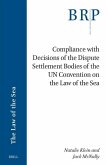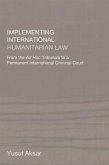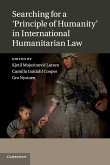Inducing Compliance with International Humanitarian Law
Herausgeber: Krieger, Heike
Inducing Compliance with International Humanitarian Law
Herausgeber: Krieger, Heike
- Broschiertes Buch
- Merkliste
- Auf die Merkliste
- Bewerten Bewerten
- Teilen
- Produkt teilen
- Produkterinnerung
- Produkterinnerung
Evaluates various means of inducing compliance with international humanitarian law by state and non-state actors.
Andere Kunden interessierten sich auch für
![The Oxford Guide to International Humanitarian Law The Oxford Guide to International Humanitarian Law]() The Oxford Guide to International Humanitarian Law83,99 €
The Oxford Guide to International Humanitarian Law83,99 €![Compliance with Decisions of the Dispute Settlement Bodies of the Un Convention on the Law of the Sea Compliance with Decisions of the Dispute Settlement Bodies of the Un Convention on the Law of the Sea]() Natalie KleinCompliance with Decisions of the Dispute Settlement Bodies of the Un Convention on the Law of the Sea108,99 €
Natalie KleinCompliance with Decisions of the Dispute Settlement Bodies of the Un Convention on the Law of the Sea108,99 €![Protection of Civilians in Modern Conflicts and International Humanitarian Law Protection of Civilians in Modern Conflicts and International Humanitarian Law]() Protection of Civilians in Modern Conflicts and International Humanitarian Law27,99 €
Protection of Civilians in Modern Conflicts and International Humanitarian Law27,99 €![A History of Humanitarian Intervention A History of Humanitarian Intervention]() Mark Swatek-EvensteinA History of Humanitarian Intervention40,99 €
Mark Swatek-EvensteinA History of Humanitarian Intervention40,99 €![Implementing International Humanitarian Law Implementing International Humanitarian Law]() Yusuf AksarImplementing International Humanitarian Law77,99 €
Yusuf AksarImplementing International Humanitarian Law77,99 €![The Right to Life Protected Persons during Armed Conflict: A Comparative Study of International Humanitarian Law and Human Rights Law The Right to Life Protected Persons during Armed Conflict: A Comparative Study of International Humanitarian Law and Human Rights Law]() Saqib JawadThe Right to Life Protected Persons during Armed Conflict: A Comparative Study of International Humanitarian Law and Human Rights Law87,99 €
Saqib JawadThe Right to Life Protected Persons during Armed Conflict: A Comparative Study of International Humanitarian Law and Human Rights Law87,99 €![Searching for a 'Principle of Humanity' in International Humanitarian Law Searching for a 'Principle of Humanity' in International Humanitarian Law]() Searching for a 'Principle of Humanity' in International Humanitarian Law47,99 €
Searching for a 'Principle of Humanity' in International Humanitarian Law47,99 €-
-
-
Evaluates various means of inducing compliance with international humanitarian law by state and non-state actors.
Hinweis: Dieser Artikel kann nur an eine deutsche Lieferadresse ausgeliefert werden.
Hinweis: Dieser Artikel kann nur an eine deutsche Lieferadresse ausgeliefert werden.
Produktdetails
- Produktdetails
- Verlag: Cambridge University Press
- Seitenzahl: 575
- Erscheinungstermin: 13. Dezember 2018
- Englisch
- Abmessung: 229mm x 152mm x 30mm
- Gewicht: 762g
- ISBN-13: 9781107499560
- ISBN-10: 1107499569
- Artikelnr.: 53775482
- Herstellerkennzeichnung
- Libri GmbH
- Europaallee 1
- 36244 Bad Hersfeld
- gpsr@libri.de
- Verlag: Cambridge University Press
- Seitenzahl: 575
- Erscheinungstermin: 13. Dezember 2018
- Englisch
- Abmessung: 229mm x 152mm x 30mm
- Gewicht: 762g
- ISBN-13: 9781107499560
- ISBN-10: 1107499569
- Artikelnr.: 53775482
- Herstellerkennzeichnung
- Libri GmbH
- Europaallee 1
- 36244 Bad Hersfeld
- gpsr@libri.de
1. Introduction Heike Krieger; Part I. Conditions for Compliance by Armed
Groups, Focussing on Non-Hierarchical Instruments: 2. Rational motives for
civilian targeting in civil war Reed Wood; 3. Insurgent governance in the
Democratic Republic of the Congo Zachariah Mampilly; 4. The power of
persuasion: the role of international non-governmental organizations in
engaging armed groups Ulrich Schneckener and Claudia Hofmann; 5. Comment -
persuading armed groups to better respect international humanitarian law
Olivier Bangerter; 6. Implementing humanitarian norms through non-state
armed groups Sandesh Sivakumaran; Part II. Criminal Prosecution:
Hierarchical Enforcement on Different Levels: 7. Courts of armed groups a
tool for inducing higher compliance with international humanitarian law?
Jan Willms; 8. Comment - perspectives on courts established by armed
opposition groups Dieter Fleck; 9. The role of international criminal
prosecutions in increasing compliance with international humanitarian law
in contemporary African conflicts Robert Cryer; 10. National courts: the
situation in the Democratic Republic of the Congo Jean-Michel Kumbu; 11.
Comment - the Congolese legal system and the fight against impunity for the
most serious international crimes Balingene Kahombo; Part III.
International Organisations as Actors for Ensuring Compliance: 12.
Enforcing international humanitarian law through human rights bodies
Dominik Steiger; 13. Comment - enforcement of international humanitarian
law through the human rights organs of the African Union Faustin Zacharie
Ntoubandi; 14. The UN Security Councils special compliance systems - the
regime of children and armed conflict Regina Klostermann; 15. Ensuring
peacekeepers' respect for international humanitarian law Siobhán Wills; 16.
Comment - obligations of States contributing to UN peacekeeping missions
under Common Article 1 to the Geneva Conventions Matthew Happold; 17.
Comment - UN peacekeeping in the Democratic Republic of the Congo: the
travails of civilian protection Denis M. Tull; Part IV. The Role of Third
States: 18. Common Article 1 to the Geneva Conventions: scope and content
of the obligation to ensure respect - narrow but deep or wide and shallow?
Robin Geiß; 19. Complicity in violations of international humanitarian law
Helmut Philipp Aust; 20. International responsibility for humanitarian law
violations by armed groups Kirsten Schmalenbach; Conclusion: 21. Where
states fail, non-state actors rise? Inducing compliance with international
humanitarian law in areas of limited statehood Heike Krieger.
Groups, Focussing on Non-Hierarchical Instruments: 2. Rational motives for
civilian targeting in civil war Reed Wood; 3. Insurgent governance in the
Democratic Republic of the Congo Zachariah Mampilly; 4. The power of
persuasion: the role of international non-governmental organizations in
engaging armed groups Ulrich Schneckener and Claudia Hofmann; 5. Comment -
persuading armed groups to better respect international humanitarian law
Olivier Bangerter; 6. Implementing humanitarian norms through non-state
armed groups Sandesh Sivakumaran; Part II. Criminal Prosecution:
Hierarchical Enforcement on Different Levels: 7. Courts of armed groups a
tool for inducing higher compliance with international humanitarian law?
Jan Willms; 8. Comment - perspectives on courts established by armed
opposition groups Dieter Fleck; 9. The role of international criminal
prosecutions in increasing compliance with international humanitarian law
in contemporary African conflicts Robert Cryer; 10. National courts: the
situation in the Democratic Republic of the Congo Jean-Michel Kumbu; 11.
Comment - the Congolese legal system and the fight against impunity for the
most serious international crimes Balingene Kahombo; Part III.
International Organisations as Actors for Ensuring Compliance: 12.
Enforcing international humanitarian law through human rights bodies
Dominik Steiger; 13. Comment - enforcement of international humanitarian
law through the human rights organs of the African Union Faustin Zacharie
Ntoubandi; 14. The UN Security Councils special compliance systems - the
regime of children and armed conflict Regina Klostermann; 15. Ensuring
peacekeepers' respect for international humanitarian law Siobhán Wills; 16.
Comment - obligations of States contributing to UN peacekeeping missions
under Common Article 1 to the Geneva Conventions Matthew Happold; 17.
Comment - UN peacekeeping in the Democratic Republic of the Congo: the
travails of civilian protection Denis M. Tull; Part IV. The Role of Third
States: 18. Common Article 1 to the Geneva Conventions: scope and content
of the obligation to ensure respect - narrow but deep or wide and shallow?
Robin Geiß; 19. Complicity in violations of international humanitarian law
Helmut Philipp Aust; 20. International responsibility for humanitarian law
violations by armed groups Kirsten Schmalenbach; Conclusion: 21. Where
states fail, non-state actors rise? Inducing compliance with international
humanitarian law in areas of limited statehood Heike Krieger.
1. Introduction Heike Krieger; Part I. Conditions for Compliance by Armed
Groups, Focussing on Non-Hierarchical Instruments: 2. Rational motives for
civilian targeting in civil war Reed Wood; 3. Insurgent governance in the
Democratic Republic of the Congo Zachariah Mampilly; 4. The power of
persuasion: the role of international non-governmental organizations in
engaging armed groups Ulrich Schneckener and Claudia Hofmann; 5. Comment -
persuading armed groups to better respect international humanitarian law
Olivier Bangerter; 6. Implementing humanitarian norms through non-state
armed groups Sandesh Sivakumaran; Part II. Criminal Prosecution:
Hierarchical Enforcement on Different Levels: 7. Courts of armed groups a
tool for inducing higher compliance with international humanitarian law?
Jan Willms; 8. Comment - perspectives on courts established by armed
opposition groups Dieter Fleck; 9. The role of international criminal
prosecutions in increasing compliance with international humanitarian law
in contemporary African conflicts Robert Cryer; 10. National courts: the
situation in the Democratic Republic of the Congo Jean-Michel Kumbu; 11.
Comment - the Congolese legal system and the fight against impunity for the
most serious international crimes Balingene Kahombo; Part III.
International Organisations as Actors for Ensuring Compliance: 12.
Enforcing international humanitarian law through human rights bodies
Dominik Steiger; 13. Comment - enforcement of international humanitarian
law through the human rights organs of the African Union Faustin Zacharie
Ntoubandi; 14. The UN Security Councils special compliance systems - the
regime of children and armed conflict Regina Klostermann; 15. Ensuring
peacekeepers' respect for international humanitarian law Siobhán Wills; 16.
Comment - obligations of States contributing to UN peacekeeping missions
under Common Article 1 to the Geneva Conventions Matthew Happold; 17.
Comment - UN peacekeeping in the Democratic Republic of the Congo: the
travails of civilian protection Denis M. Tull; Part IV. The Role of Third
States: 18. Common Article 1 to the Geneva Conventions: scope and content
of the obligation to ensure respect - narrow but deep or wide and shallow?
Robin Geiß; 19. Complicity in violations of international humanitarian law
Helmut Philipp Aust; 20. International responsibility for humanitarian law
violations by armed groups Kirsten Schmalenbach; Conclusion: 21. Where
states fail, non-state actors rise? Inducing compliance with international
humanitarian law in areas of limited statehood Heike Krieger.
Groups, Focussing on Non-Hierarchical Instruments: 2. Rational motives for
civilian targeting in civil war Reed Wood; 3. Insurgent governance in the
Democratic Republic of the Congo Zachariah Mampilly; 4. The power of
persuasion: the role of international non-governmental organizations in
engaging armed groups Ulrich Schneckener and Claudia Hofmann; 5. Comment -
persuading armed groups to better respect international humanitarian law
Olivier Bangerter; 6. Implementing humanitarian norms through non-state
armed groups Sandesh Sivakumaran; Part II. Criminal Prosecution:
Hierarchical Enforcement on Different Levels: 7. Courts of armed groups a
tool for inducing higher compliance with international humanitarian law?
Jan Willms; 8. Comment - perspectives on courts established by armed
opposition groups Dieter Fleck; 9. The role of international criminal
prosecutions in increasing compliance with international humanitarian law
in contemporary African conflicts Robert Cryer; 10. National courts: the
situation in the Democratic Republic of the Congo Jean-Michel Kumbu; 11.
Comment - the Congolese legal system and the fight against impunity for the
most serious international crimes Balingene Kahombo; Part III.
International Organisations as Actors for Ensuring Compliance: 12.
Enforcing international humanitarian law through human rights bodies
Dominik Steiger; 13. Comment - enforcement of international humanitarian
law through the human rights organs of the African Union Faustin Zacharie
Ntoubandi; 14. The UN Security Councils special compliance systems - the
regime of children and armed conflict Regina Klostermann; 15. Ensuring
peacekeepers' respect for international humanitarian law Siobhán Wills; 16.
Comment - obligations of States contributing to UN peacekeeping missions
under Common Article 1 to the Geneva Conventions Matthew Happold; 17.
Comment - UN peacekeeping in the Democratic Republic of the Congo: the
travails of civilian protection Denis M. Tull; Part IV. The Role of Third
States: 18. Common Article 1 to the Geneva Conventions: scope and content
of the obligation to ensure respect - narrow but deep or wide and shallow?
Robin Geiß; 19. Complicity in violations of international humanitarian law
Helmut Philipp Aust; 20. International responsibility for humanitarian law
violations by armed groups Kirsten Schmalenbach; Conclusion: 21. Where
states fail, non-state actors rise? Inducing compliance with international
humanitarian law in areas of limited statehood Heike Krieger.








